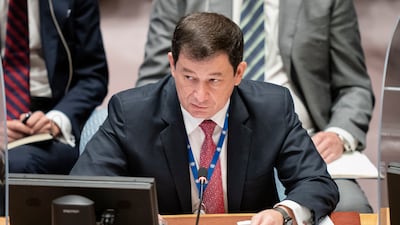Russia’s deputy UN ambassador, Dmitry Polyanskiy, on Tuesday welcomed the UAE, Albania, Brazil, Gabon and Ghana to their two-year terms on the UN Security Council, which begin on Saturday.
Speaking with reporters in New York, Mr Polyanskiy said Moscow had “quite good relations” with all the newcomers to the 15-member council. All were all elected unopposed by UN members in June.
“I'm looking forward to welcoming new members on January 1 and to working with them,” Mr Polyanskiy said in answer to a question from The National.
“We sometimes agree to disagree, but we understand that there is a big responsibility on our shoulders. And we need to carry on … to find compromises and to find some openings and possibilities to move forward."
The Security Council has 10 seats for temporary members but is dominated by its five permanent members — Russia, China, the US, Britain and France — which hold the power of veto.
The 2022-2023 term will be the UAE’s second stint on the council after serving from 1986-1987.
Brazil has served on the council 10 times, and Gabon and Ghana three times each. Albania has never served on the council.
“Looking at the … incoming members, I can't say that we have particular problems with any one of them. We have bilaterally quite good relations,” said Mr Polyanskiy.
“There are nuances of course and the devil is in the details … It will depend on the development of the situation and the world. But I'm absolutely sure that the Security Council will preserve its collective spirit."

The UAE’s ambassador to the UN, Lana Nusseibeh, was on Tuesday elevated to the rank of minister.
The UAE mission to the UN on Tuesday vowed to use its council membership to foster peace, resilience and innovation around the world.
“#StrongerUnited is the spirit that guides us in our work,” the mission posted on social media.
The council meets regularly on threats to international peace and security, and makes the ultimate decisions on resolutions imposing international sanctions, authorising the use of military force and launching peacekeeping missions.
Its case file includes Syria, Yemen, Libya, Iraq, Lebanon, Ukraine, Ethiopia, North Korea and other hotspots, as well as the decades-old Palestinian-Israeli conflict and the Iranian nuclear programme.
To be adopted, council resolutions need at least nine votes in favour and no vetoes from permanent members.
The council is often deadlocked on issues where the permanent members disagree, such as on Syria, Myanmar and Ukraine.









































